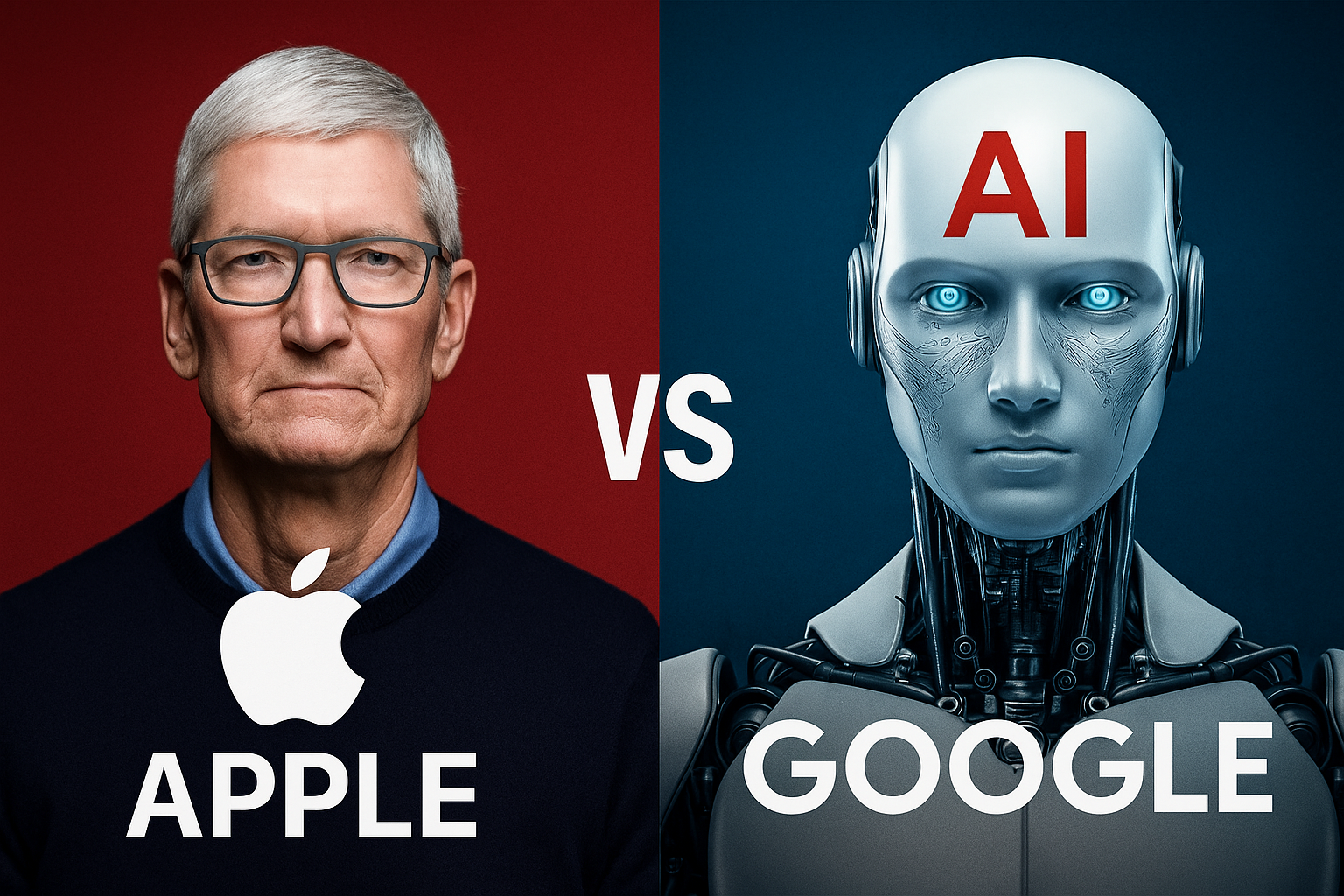As tech giants make bold AI moves, Apple’s cautious strategy raises questions about its role in shaping the future of artificial intelligence.
Report by GlobalTimesAI.com | Published August 3, 2025
Despite immense hype surrounding Artificial Intelligence, Apple has often appeared sidelined compared to Microsoft, Google, Meta, and China’s tech giants. But recent corporate moves and strategic announcements show that Apple’s quiet, ecosystem-first AI approach might be more calculated than cautious.
Apple’s Current AI Landscape: Steady, Not Spectacular
Apple Intelligence Takes Shape
At WWDC 2025, Apple unveiled new Apple Intelligence features spanning iPhone, iPad, Mac, Apple Watch, and Vision Pro. The platform now includes tools like Live Translation, visual intelligence on-screen actions, Genmoji, and integration with Shortcuts and Image Playground. Developers gained access to on-device foundation models, offering private, offline AI interactions PYMNTS.com+
In parallel, Liquid Glass was revealed—a sweeping UI redesign across iOS 26, macOS Tahoe, and watchOS 26, reflecting Apple’s holistic commitment to modern, AI-aware design Laptop Mag+2Wikipedia+2Wikipedia+2.
Skepticism and Delay
Despite these, AI critics argue Apple is behind the curve. Analysts note that Siri lags behind rivals’ assistants, and some promised features remain delayed until 2026. As one tech note put it: “Apple is likely three-plus years away from delivering a truly modern AI assistant.” PYMNTS.com
Tim Cook’s Pivot: Investment, Reorg & Acquisitions
Open to M&A
Apple CEO Tim Cook recently emphasized being “very open to mergers and acquisitions that accelerate our roadmap.” In 2025, Apple acquired seven AI-related startups—but nothing major like OpenAI yet TechCrunch+

Bigger Budget, Bigger Vision
Apple has pledged a $500 billion AI investment roadmap over four years, combining capital expenditure, internal innovation, and potential expansions of its Private Cloud Compute infrastructure AInvest.
SVP of Hardware Technologies Johny Srouji highlighted that AI is now integral to chip design workflows, speeding up development and reinforcing Apple’s silicon leadership The Times of India.
What Apples Rivals Are Doing
Microsoft & OpenAI
Microsoft remains a frontrunner—embedding OpenAI’s GPT models into Azure, Office, and ChatGPT. Apple lags here, with no cloud-first LLM deployment yet.
Google & Meta
Google’s Gemini series and Meta’s Llama 3 continue to set performance expectations. Apple’s on-device model reportedly ties with GPT-3 and competes against smaller models like Mistral, but trails GPT-4 in cloud-based benchmarks AInvestWikipedia+
Chinese giants like Baidu, Alibaba, and Tencent are aggressively deploying AI across healthcare, education, governance, and surveillance at scale.
AI in Apple’s Ecosystem: Where It Hits Now
Apple is betting on integration over flash:
- On-device AI tools: Writing assistance, content cleanup, live translation, and Siri enhancements—centered around user privacy.
- Developer access: Third-party apps can tap into foundation models while enforcing end‑to‑end encryption via Apple silicon InvestWikipedia.
- Vision Pro & CarPlay: AI enhancements are coming to spatial computing and in-car interfaces, maintaining Apple’s hardware-driven advantage Tom’s Hardware+
Apple vs. AI Giants: A Strategy Comparison
| Area | Apple | Microsoft / Google / Meta / China |
|---|---|---|
| AI Investments | $13–14B CapEx; open to M&A; ecosystem-first | Tens of billions in cloud infrastructure and R&D |
| Product Focus | Incremental features like Genmoji, visual AI, Siri 2026 | Large models, SaaS, LLM APIs, developer ecosystems |
| Privacy Approach | Strongly on-device, encrypted cloud, data minimized | Cloud-first, more user data dependence and openness |
| Innovation Pace | Conservative, quality-first | Rapid, iterative, early release mindset |
| Ecosystem Control | Tight device-software integration across Apple platforms | Cross-platform and cross-company third-party dominance |
Why Apple Isn’t Just Selling iPhones: A Long-Term AI Play
- Gradual rollout: Apple Intelligence is already on 250 million devices and growing. Cinco Días+
- Privacy-first model: Foundation models running locally or on closed, secure Apple cloud servers instantiate trust.
- Hardware synergy: From chips to operating systems to Vision Pro, AI fuels Apple’s closed, unified ecosystem Wikipedia.
Final Takeaway: Is Apple Falling Behind or Recalibrating?
Apple may not lead in flashy AI features or big language model benchmarks today—but the company is investing heavily to catch up. Its strength lies in integration, control, and trust, not speed alone. While competitors rush, Apple plays the long game—ensuring AI works seamlessly, safely, and privately within its ecosystem.
The iPhone may be at the center for now—but AI is quietly expanding into every corner of Apple’s future.
Disclaimer:
The content in this article is based on publicly available information, official company statements, and industry analyses. All brand names, trademarks, and logos are the property of their respective owners. This article is intended for informational and editorial purposes only. Images used in this article are AI-generated or used for reference with fair use intent. GlobalTimesAI.com does not claim any official affiliation with Apple, Microsoft, Meta, or any companies mentioned herein.